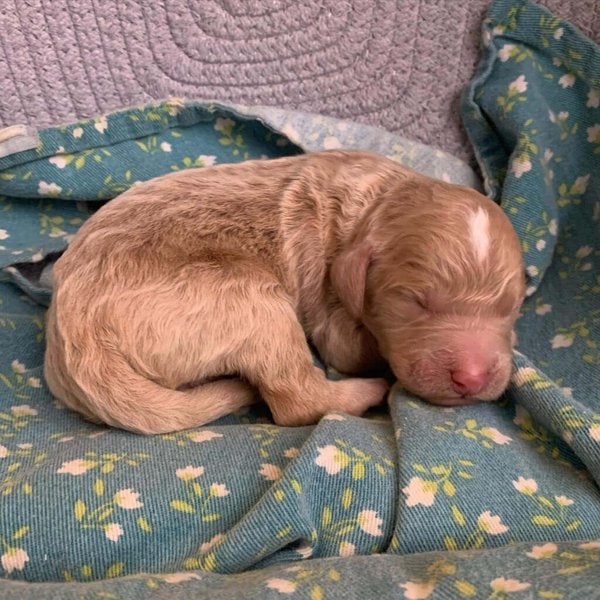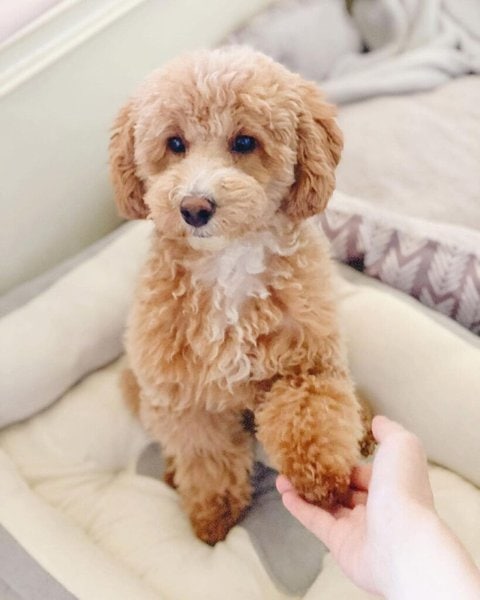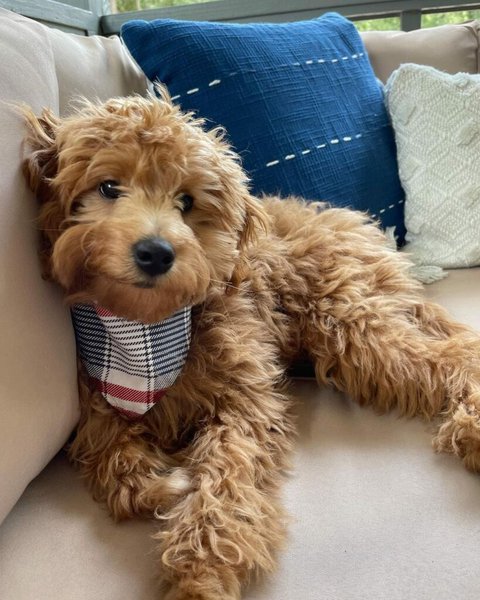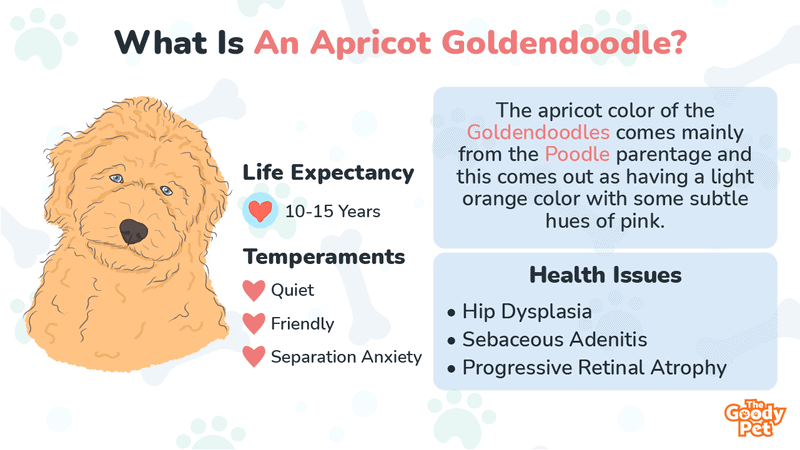Goldendoodles come in a variety of shapes and shades due to the myriad possible color combinations of their parents. They also come in 13 different colors, from white to chocolate brown, and in a couple of different patterns, too, such as phantom, parti, or brindle. In this article, we will discuss the most popular of these variations – the Apricot Goldendoodle.
The Apricot Goldendoodle remains one of the very sought-after among the many designer dog breeds available today because it combines the docility and gentle manner of the Golden Retriever, and the smarts and non-shedding qualities of a Poodle. Not forgetting the alluring pinkish-orange color and the curly pattern of its coat is in, one can see why the Apricot Goldendoodle is so likable.
In the following discussion, we will learn about what makes this teddy bear look-alike so popular among dog lovers. We will know its temperament, grooming needs, possible health problems, and dietary needs and if this is the right fit for you or your family.
What Color Is An Apricot Goldendoodle?
The apricot color of the Goldendoodles comes mainly from the Poodle parentage and this comes out as having a light orange color with some subtle hues of pink. This very much makes these pooches look like teddy bears, thus, their popularity with pet lovers.
Physical Appearance
The appearance of your Apricot Goldendoodle depends on its Poodle parentage, but in general, Apricot Goldendoodle has a round, broad skull with long muzzles, dark, oval-shaped eyes, a dark nose, and droopy ears. If it takes after its Golden Retriever parents, then it would have a long, muscular body with a thick-coated tail.
Size
Given that the Golden Retriever used for breeding only comes in one standard size, the size of the Apricot Goldendoodle is dependent on the Poodle parent, which can be either toy, miniature, or standard.
A Toy Apricot Goldendoodle could grow from a petite 10 inches to at most 16 inches tall; the miniature one from 16 to 20 inches; and the standard one from 20 to 24 inches.
The weight for Apricot Goldendoodles across all size variations is typically between 15 to 80 lbs.
Coat
The Apricot Goldendoodle’s coat type depends on the percentage of the pooch’s Poodle heritage and comes in three varieties: straight, wavy, or curly. Simply put, the higher the Poodle genes, the curlier their fur is, and the degree of shedding would be lower.
This degree could be classified by what they call generational traits. An F1 Goldendoodle has genes split 50/50 between a Golden Retriever and a Poodle. They usually have straight hair and moderate shedding.
An F1B has 75% Poodle strain. Therefore, the fur is curly and sheds very little, making it very hypoallergenic. Further classifications relating to the percentage of their heritage include F1BB, F2, F2B, and F3.

How Long Do Apricot Goldendoodles Live?
A healthy Apricot Goldendoodle would have an average lifespan of 10 to 15 years. Being a mixed breed, they also benefit from what is termed “hybrid vigor”.
The combined genes of two purebreds promote greater genetic diversity, which decreases their susceptibility to diseases. Still, it is useful to be knowledgeable about the diseases that the Goldendoodles are susceptible to for you to be better prepared when the need arises.
Hip Dysplasia
A common genetic disease that affects the hip joints where there is improper alignment of the ball and socket, causing poor movements of the legs. Home therapy is one of the treatment options.
Sebaceous Adenitis
This is a skin disease caused by the inflammation of the sebaceous glands responsible for the production of sebum to keep your pet’s skin moisturized. This inflammation reduces the amount of sebum, causing the skin to dry out a lot faster and leading to a bacterial or yeast-related infection setting in.
The symptoms include whitish scaling of the skin, a musty odor, excessive matting, and hair loss.
Progressive Retinal Atrophy
This is a degenerative eye disease that affects the retina that leads to poor vision and eventual blindness. Sadly, there is no treatment for this eye disease.
Megaesophagus
A digestive condition is when the muscles of the esophagus are unable to push food and water into the stomach, causing the dog to regurgitate. One way to manage this health issue is by using a Bailey chair to prevent regurgitation.
Other common health issues to look out for are ear infections, cataracts, obesity, heart conditions, and Addison’s Disease.
When adopting an Apricot Goldendoodle, it is best to do some research on the breeder you are buying from. They should provide you with the necessary documentation that the parents of the puppy are healthy and properly screened for genetic diseases common to these dogs.

How To Take Care Of Your Apricot Goldendoodle?
Diet
Apricot Goldendoodles are continually active and full of energy, so they would need a balanced diet rich in protein and essential fats. The size, age, and level of activity would determine the amount of its daily food intake. This adult pooch normally needs 2 to 4 cups of food, split between two servings every day.
Pet Plate is a healthy, freshly cooked meal that is a great alternative to the commercially bought dog foods available. Each meal is correctly portioned for your pet’s needs, and veterinary nutritionists make sure that what your pooch is getting is nutritious, natural, and fresh.
Giving your Apricot Goldendoodle multivitamins has also added benefits, such as increased absorption of vital compounds and improved skin and coat health.
Exercise
If you are an active individual or have an active family, this pooch is the right one for you. The Apricot Goldendoodle requires at least 30 minutes to one hour of daily exercise to satisfy its high-energy needs.
Playing frisbee or playing fetch are great activities since it satisfies the Labrador Retriever’s instincts and keeps it mentally stimulated. Taking your Apricot Goldendoodle for a run, a swim, or maybe just a walk around the neighborhood, is also a fun activity for this pooch.
Dental Water Additives
Aside from regularly brushing your Apricot Goldendoodle’s teeth and giving it dental chews, adding a few drops of dental water additives into its water bowl helps in the prevention of plaque and tartar growth that can lead to eventual teeth loss.
Dental water additives have natural or non-natural ingredients, depending on the brand, that inhibits the growth of plaque and keeps your pooch’s breath smelling fresh. It has the added bonus of cleaning the water in the serving bowl by eliminating harmful bacteria that can cause sickness.
Do Apricot Goldendoodles Bark A Lot? Temperaments Of Apricot Goldendoodles
Apricot Goldendoodles are not excessive barkers. They are quiet and only bark when they are being playful or when they sense some danger.
However, as a social dog breed, the Apricot Goldendoodle tends to suffer from separation anxiety if left alone for too long and too often, typically beyond 6 hours. Feelings of anxiety may develop, thereby triggering your pet to bark excessively.
Are Apricot Goldendoodles Hyper?
It is only during their growing years that the Apricot Goldendoodles seem to be a mad ball of fun with their hyperactivity. This is what makes them so adorable for lots of dog owners, to begin with. Giving them enough exercise and activities would satisfy their high-energy needs.
How Are Apricot Goldendoodles As Family Pets?
The behavior of Apricot Goldendoodles is not dependent on the color of the mix. Generally, all Goldendoodles follow the same pattern of inheriting the Golden Retriever’s mild, trustworthy, and friendly nature, and the Poodle’s intelligence and trainability.
Apricot Goldendoodles are perfect as family dogs with their playfulness and exuberant energy. They will get along very well with kids as with all family members and other pets, even cats. This crossbreed also shows a similar retrieving tendency, like what the Golden Retriever does.
Any form of aggressive behavior is exceedingly rare, and these cases may be a result of improper nurturing and outright negligence. As a matter of fact, Apricot Goldendoodles are one of the friendliest mixed breeds around, and not only great as companion dogs but also ideal to become either therapy dogs or guide dogs.

Do Apricot Goldendoodles Turn White? Grooming Tips For Apricot Goldendoodles
It should be noted that your Apricot Goldendoodle’s fur color may lighten when they shed their puppy fur and take a color that is nearer to cream or tan.
This is normal because a Poodle’s fur typically lightens as it matures in a process called ‘clearing’.
Do Apricot Goldendoodles Shed?
Depending on whose bloodline it takes more from, the Apricot Goldendoodle can shed lightly or moderately. It can shed all year round but more so during the spring and fall.
When kept indoors frequently, the Apricot Goldendoodle tends to shed less during their seasonal shedding than those taken outside regularly because of the exposure to seasonal changes in daylight.
In addition, an Apricot Goldendoodle with straight fur sheds more than its curlier cousins.
Brushing Of Coat
Daily brushing should be standard practice for these pooches. Brushing helps reduce the matting and knotting of furs, especially when you have a curly pooch. This also relieves you of any hassle of cleaning your house of accumulated dead fur.
Using a product like the FURminator Undercoat Tool reduces the amount of shedding by as much as 90% and has a curved edge that follows your pet’s natural curve.
Bathing
Bathing your pet too often may cause dry, itchy skin. Twice-a-month bathing will be sufficient or as needed if you find your pooch having an odor. Pro Pet Works All Natural Organic 5 In 1 Oatmeal Pet Shampoo And Conditioner is one we recommend using. It is specially formulated for dogs with sensitive skin and provides relief from itching.
Additionally, you should consider having their hair trimmed professionally every three months or so to ensure that overgrown fur around their eyes, ears, and paws, is kept at its proper length.
Related Questions
How Much Is An Apricot Goldendoodle? The cost of adopting an Apricot Goldendoodle falls in the range of $1,500 to $2,500. The price is heavily influenced by several factors, such as generation type, size, and breeder reputation. Typically, the more Poodle genes it has, meaning that it sheds very lightly, the more expensive it will cost.
Can Apricot Goldendoodles Swim? Yes, the Apricot Goldendoodles are natural in the water since they are the progeny of two water breeds. Their webbed feet are excellent in treading in water, plus their thick coats help to keep them afloat. Start training your pooch to swim when they are at least 3 months old, and remember to slowly adapt them to the water to avoid the fear of the water.
What Is The Rarest Color Of Goldendoodle? The rarest colors of Goldendoodles are blue, silver, and gray. This is the result of multi-generational breeding, where the recessive color traits are intentionally bred rather than the dominant color genes. Multi-colored Goldendoodles are also rare, like the Parti and the Phantom. A Parti Goldendoodle is 50% white with some patches of solid color, while the phantom has a primary color of either black, red, or chocolate with secondary markings of apricot, cream, or gray.





